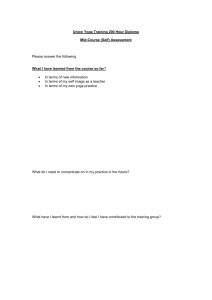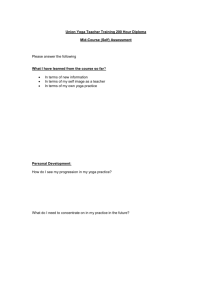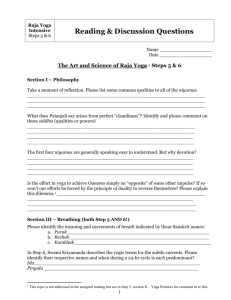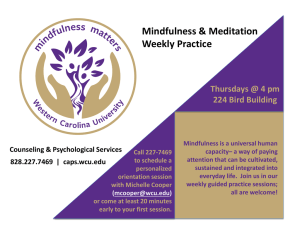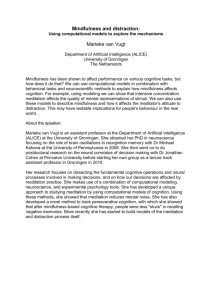Yoga and Meditation: Review of Current Research November 2014
advertisement
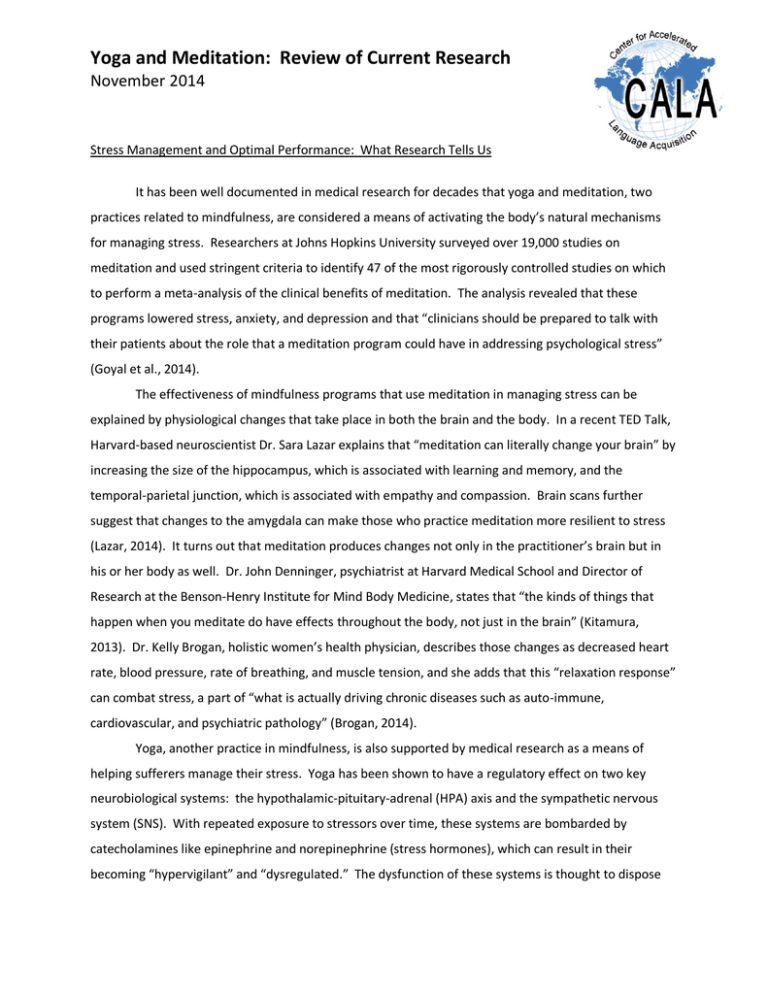
Yoga and Meditation: Review of Current Research November 2014 Stress Management and Optimal Performance: What Research Tells Us It has been well documented in medical research for decades that yoga and meditation, two practices related to mindfulness, are considered a means of activating the body’s natural mechanisms for managing stress. Researchers at Johns Hopkins University surveyed over 19,000 studies on meditation and used stringent criteria to identify 47 of the most rigorously controlled studies on which to perform a meta-analysis of the clinical benefits of meditation. The analysis revealed that these programs lowered stress, anxiety, and depression and that “clinicians should be prepared to talk with their patients about the role that a meditation program could have in addressing psychological stress” (Goyal et al., 2014). The effectiveness of mindfulness programs that use meditation in managing stress can be explained by physiological changes that take place in both the brain and the body. In a recent TED Talk, Harvard-based neuroscientist Dr. Sara Lazar explains that “meditation can literally change your brain” by increasing the size of the hippocampus, which is associated with learning and memory, and the temporal-parietal junction, which is associated with empathy and compassion. Brain scans further suggest that changes to the amygdala can make those who practice meditation more resilient to stress (Lazar, 2014). It turns out that meditation produces changes not only in the practitioner’s brain but in his or her body as well. Dr. John Denninger, psychiatrist at Harvard Medical School and Director of Research at the Benson-Henry Institute for Mind Body Medicine, states that “the kinds of things that happen when you meditate do have effects throughout the body, not just in the brain” (Kitamura, 2013). Dr. Kelly Brogan, holistic women’s health physician, describes those changes as decreased heart rate, blood pressure, rate of breathing, and muscle tension, and she adds that this “relaxation response” can combat stress, a part of “what is actually driving chronic diseases such as auto-immune, cardiovascular, and psychiatric pathology” (Brogan, 2014). Yoga, another practice in mindfulness, is also supported by medical research as a means of helping sufferers manage their stress. Yoga has been shown to have a regulatory effect on two key neurobiological systems: the hypothalamic-pituitary-adrenal (HPA) axis and the sympathetic nervous system (SNS). With repeated exposure to stressors over time, these systems are bombarded by catecholamines like epinephrine and norepinephrine (stress hormones), which can result in their becoming “hypervigilant” and “dysregulated.” The dysfunction of these systems is thought to dispose one to diseases such as “obesity, diabetes, autoimmune disorders, depression, substance abuse, and cardiovascular disease” (Ross & Thomas, 2010). Dr. Bessel Van der Kolk, professor of psychiatry at Boston Medical School and one of the world’s leading authorities on post-traumatic stress disorder (PTSD), has recognized this “down-regulation” benefit of yoga and applied it to his practice with PTSD patients. Van der Kolk eloquently describes the physiological basis of stress and how yoga practice can help alleviate that stress: “Traumatized people often are terrified of the sensations in their own bodies . . . . [which] makes it hard to take pleasure in the present because the body keeps replaying the past. [Yoga] is a way for people to regulate the core arousal system in the brain and feel safe inside their bodies” (Van der Kolk, 2009). In addition to promoting health and managing stress, research has demonstrated that mindfulness activities can also improve attention and cognition. Dr. Judson Brewer at the Yale School of Medicine, for example, explains that experienced meditators show deactivation of the default mode network (DMN), a region involved in “daydreaming and mind-wandering.” His research also shows that meditators show functional changes in different areas of the cingulate and prefrontal cortices, both of which are crucial regions for cognitive control. According to Brewer, “meditation may transform the normal, resting function of the brain into one that more closely resembles a meditative state . . . from that of mind-wandering to one of being centered in the present.” Brewer even goes on to weigh in on the clinical significance of these findings vis-à-vis improved stress management: “[Meditation] could certainly be used to help people work through frustration and anxiety so that they don’t move into a clinical depression or clinical anxiety disorder, or start using drugs. But at the same time, it can be used when people already have these disorders.” (Brewer & Worhunsky, 2011). This finding was replicated at MIT where researchers found that, after an 8-week training program, meditators were able to better control their brain’s alpha rhythms, which help suppress attention to irrelevant or distracting sensory information. Christopher Moore, MIT neuroscientist, summarizes the team’s findings: “Our data indicate that meditation training makes you better at focusing, in part by allowing you to better regulate how things that arise will impact you” (Trafton, 2011). These findings on the value of mindfulness in focusing attention and reducing distracting thoughts have clear clinical implications. Dr. Elizabeth Hoge, assistant professor Harvard Medical School and psychiatrist at the Center for Anxiety and Traumatic Stress Disorders at Massachusetts General Hospital, affirms that mindfulness teaches the practitioner to differentiate distracting thoughts from the “core self,” a pattern often seen in patients with generalized anxiety: “They can’t distinguish between a problem-solving thought and a nagging worry that has no benefit . . . [and] if you have unproductive 2 worries, you can train yourself to experience those thoughts completely differently” (Corliss, 2014). Johns Hopkins observed a similar phenomenon among school-age children (4th and 5th graders) who participated in a 12-week yoga program. After 12 weeks, students who did yoga were “less likely to ruminate the kind of brooding thoughts associated with depression and anxiety that can be a reaction to stress” (Brewington, 2011). Expertise in Mindfulness: Jaggi Vasudev, the Isha Foundation, and CALA Yoga Classes Although Gaudet’s aforementioned charge to the medical profession was pronounced in 2011, there has been local interest in incorporating mindfulness into the existing medical paradigm for almost 20 years. Dr. Paul Ragan is a professor of psychiatry at Vanderbilt University Medical Center and former medical director of the Faculty and Physician Wellness Program at Vanderbilt. His research has been published in respected medical journals, and he has been interviewed on behavioral health topics by national news outlets, including NPR, CNN, and the Washington Post. He designs and oversees evidence-based programs that offer patients access to the most recent advancements in addictions treatment. Dr. Ragan became interested in a Mr. Jaggi Vasudev because of the successful yoga and meditation programs he conducted in India. In 1997, Ragan invited Vasudev to Vanderbilt University in an effort to bring attention to mindfulness, an often neglected aspect of patient care and well-being. There, before the medical establishment, Vasudev brought to light the fact that yogis have known for centuries what the scientific community has begun to confirm—that mindfulness through yoga and meditation is central to overcoming stress and disease. Since then, Vasudev has become even more renowned here in the United States and internationally. He has been invited to speak to the United Nations, the World Economic Forum, and he routinely addresses hundreds of thousands across the world. His increasing presence and influence on the world stage led to further invitations by leading institutions such as Dartmouth, MIT, and Emory, and he was invited to give the first TED Talk in India to share a yogi’s perspective on mindfulness and stress management. In addition, Vasudev founded the Isha Foundation, an internationally active non-profit organization that focuses on human development, transformation, and self-actualization through the lens of mindfulness. CALA yoga classes are taught by an instructor who has received certification from the Isha Hatha Yoga School, a residential teacher-training program based on classical yoga in India. 3 References Brewer, J.A., Worhunsky, P.D. et al. (2011). Meditation experience is associated with differences in default mode network activity and connectivity. Proceedings of the National Academy of Sciences 108, 20254-9. Brewington, K. (2011). Yoga, meditation program helps city youths cope with stress. The Baltimore Sun. Retrieved from http://articles.baltimoresun.com/2011-02-23/health/bs-hs-yoga-city-youth20110223_1_yoga-chronic-stress-researchers. Brogan, K. (2014). Taming the monkey mind—How meditation affects your health and wellbeing. Retrieved from http://articles.mercola.com/sites/articles/archive/2014/02/20/meditation-relaxationresponse.aspx?e_cid=20140220Z1A_DNL_art_1&utm_source=dnl&utm_medium=email&utm_c ontent=art1&utm_campaign=20140220Z1A&et_cid=DM39656&et_rid=432869640. Corliss, J. (2014). Mindfulness meditation may ease anxiety, mental stress. Harvard Health Publications. Retrieved from http://www.health.harvard.edu/blog/mindfulness-meditation-may-easeanxiety-mental-stress-201401086967. Gaudet, T. [pugetsoundvideo]. (2011). A critical moment in the history of medicine [Video file]. Retrieved from http://www.youtube.com/watch?v=qm44rUwh1Jw. Goyal et al. (2014). Meditation programs for psychological stress and well-being: A systematic review and meta-analysis. JAMA Internal Medicine 174(3), 357-368. Kitamura, M. (2013). Harvard yoga scientists find proof of meditation benefit. Retrieved from http://www.bloomberg.com/news/2013-11-22/harvard-yoga-scientists-find-proof-ofmeditation-benefit.html. Lazar. S. [TEDx talks]. (2011). How meditation can reshape our brains [Video file]. Retrieved from http://www.youtube.com/watch?v=m8rRzTtP7Tc. National Institute of Mental Health (NIMH). (2014). Fact sheet on stress. Retrieved from http://www.nimh.nih.gov/health/publications/stress/index.shtml. Ross, A. & Thomas, S. (2010). The health benefits of yoga and exercise: A review of comparison studies. The Journal of Alternative and Complementary Medicine 16(1), 3-12. Trafton, A. (2011). The benefits of meditation: MIT and Harvard neuroscientists explain why the practice helps tune out distractions and relieve pain. MIT News. Retrieved from http://newsoffice.mit.edu/2011/meditation-0505. Van der Kolk, B. (2009). Yoga and post-traumatic stress disorder: An interview with Bessel van der Kolk, MD. Integral Yoga Magazine, 12-13. 4

